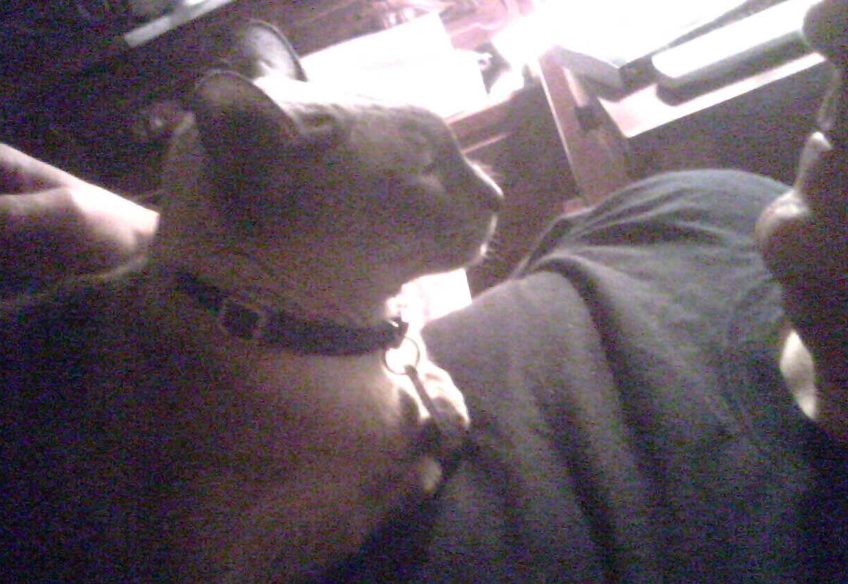
Wolly Telling Me She Loves Me and Doesn’t Want
Me to Go to the Gym*
I’m an extremely rich man. I’m so rich that I could pay to get better health care for my feline friend than is available to most of the human race.
Of course, I’m not all that rich in the context of the United States. But in the context of the world’s population, I am very, very rich. That was made clear to me when I reflected on the treatment that saved my cat Wolly’s life in a very high tech hospital. She got X-rays, a sonogram, IV fluids, medicines, and the attention of trained technicians and veterinary doctors. She’s now on a prescription low protein, low phosphate diet (for her kidney problems). She got better health care than much of the human race can afford. I would have spent more, too, if it had been necessary to save her. She’s my best friend.
Her case really made me think about the gap between the living standards in wealthy countries and in most of Africa, much of Latin America and Asia, and other parts of the planet. The best way to bridge that gap is to raise the incomes of the poor. Doing that requires changes in the legal regimes that facilitate or disrupt cooperative behavior.
When I was in Nairobi recently, several people from the International Policy Network were there to launch a new book, edited by Philip Stevens, called Fighting the Diseases of Poverty. (The full text of the book is available online, too.) It’s full of practical advice, and a very clear message: wealthier is healthier.
Wollstonecraft’s experience reinforced my commitment to helping people in poor countries to acquire the legal systems that will allow them to create and accumulate wealth, so that they can have the kind of health care that people in rich countries presently take for granted, even for their cats.
*Shortly after she came back from the hospital and was settling back in after such a trauma, I was getting ready to go to the gym in the evening, but Wolly didn’t want me to go. And she can be very insistent. So we ended up falling asleep together, but after I snapped this with my Blackberry camera.










Our cat, Patches, sends her get well wishes to Molly. Surprising since Patches does not like other cats very much. At best, she tolerates them.
Whoops, she meant Wolly. I mis-translated that last meow.
Wolly, Tiggy, and I have an interesting arrangement. Wolly arrived when it was just the two of us, and that’s how she sees things. It’s Wolly and Tom. Then…Tiggy (Antigone) arrived. She sees two people with whom to interact, Tom and Wolly. But from Wolly’s perspective, Tiggy is…..a cat. So when I get home, if Tiggy has been hassling Wolly (when Tiggy was a kitten, she delighted in full on tackles of Wolly, followed by bear hugs; I’m sure that that would not appeal to an adult human, and Wolly didn’t like it, either), Wolly sighs and says, “The cat has been bothering me today.”
Maybe Patches is like Wolly, thinking she is human. She was a street cat that we adopted. I’ve often told my wife that Patches probably has a better material existence than most of the human race. Maybe that is why she thinks she is one of us.
Were Wolly’s health problems caused by that “contaminated” pet food?
The day the information came out, I was contacted by several people about it. I checked and neither Wolly nor Tiggy were getting the brands that were recalled. They’ve eaten Science Diet dry foods only (with the occasional “Fancy Feast” very smelly canned salmon for a treat). It just seems a coincidence that the information and the recall came about at the same time as Wolly’s illness. It’s been hard to get her to eat the new food, but she’s adjusting and getting her appetite back. (Who knew that the sound of a cat crunching on dry cat food could be so beautiful?)
Although I am indifferent to cats myself, your story about Wolly compelling you to stay home from the gym reminded me of two P.G. Wodehouse stories.
They are “The Story of Webster” and “Cats will be Cats” and are to be found in the book Mulliner Nights. A bohemian artist does a favor for a rich uncle by taking in his cat for a few months, and the cat is so upper-crust that the artist soon finds himself shaving daily and wearing suits. As they say, hilarity ensues.